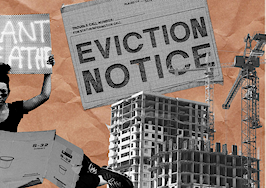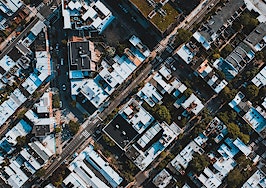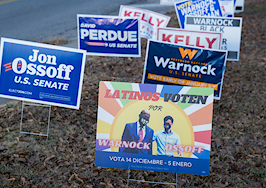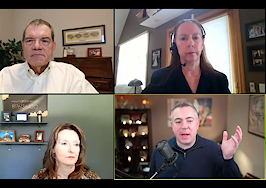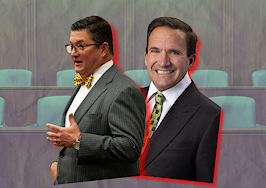Let’s make an assumption. You and your spouse have great jobs. You have a couple of great kids who do well in school. You have engaging personalities and friends from all walks of life. You are respectful, caring and kind.
You sound like the perfect neighbor. So why aren’t you? Is it because you’re Black?
I started this article to shock you a little bit. A lot has changed since last January when we celebrated Martin Luther King Jr. Day. As the president of the National Association of Real Estate Brokers (NAREB), I have seen the real estate industry jolted by recent events that have caused a refocusing on the Black community.
The first was the infamous Newsday expose, which showed how housing discrimination was still prevalent on Long Island. The second was the murder of George Floyd, and the third was the attack on the Capitol, which left so many wondering what would have occurred if the mob had consisted primarily of Black people.
I can’t tell you how many wonderful people I’ve met largely because of these incidents. My phone and email are alive with real estate professionals asking what they can do to become more aware of the plight of Blacks in America.
I literally have run out of hours talking and sharing, as I also have my clients, agents and staff at Destiny Realty in Morristown, New Jersey, to focus on. So, I came up with a list of five ways you can impact the lives of the Black community.
1. Learn about NAREB
NAREB was founded in 1947 as an equal opportunity and civil rights advocacy group for Black real estate professionals, consumers and communities. But our history actually predates the National Association of Realtors, which was founded in 1908.
Back in the 1880s, Black professionals and real estate groups began organizing largely in Southern and Northern communities. They ultimately joined the National Business League in the early 1900s, led by Booker T. Washington, who was a real estate investor along with his other work.
NAREB members are known as Realtists because historically, Blacks were not welcomed into NAR. In fact, it wasn’t until the mid-1960s when Ben Slayton, a California real estate professional, became the nation’s first Black Realtor.
NAREB also had a mandate to be inclusive of Blacks and our allies from all walks of real estate life, including appraisers, mortgage and insurance professionals and others. I encourage you to visit NAREB.com and join.
2. Look around you
I live in a relatively affluent community in New Jersey. We are among a small number of Black people in town. Although we are used to it, we are always aware of it.
When asked by real estate professionals what they can do today, I tell them to “look around you, and identify your Black neighbors.” Especially for those who live in the suburbs, this may a jarring consideration.
As I mentioned at the beginning of this article, so many Blacks have good jobs, dual incomes and are wonderful people. So why are they not in your neighborhood? Start reading and learning about your community and its history and laws. You may be shocked that the Black community has not felt welcomed for generations, and therefore, it’s not easy to flip a switch.
3. Understand ‘de facto segregation’
Think about this for a moment. It was only 67 years ago that the Supreme Court ended school segregation with Brown v. Board of Education of Topeka. This was followed by The Fair Housing Act of 1968, which expanded on the Civil Rights Act of 1964, and prohibited discrimination concerning the sale, rental and financing of housing based on race, religion, national origin, sex, handicap and family status.
Despite these legal protections from segregation, the practice of Blacks living separately from non-Blacks persists by what is referred to as “de facto segregation.” This is mostly influenced by economic disparities between whites and Blacks, who on average earn less than whites. This economic gap prevents Blacks from living in more affluent neighborhoods that they are essentially shut out of.
As neighborhoods become more segregated by this financial influence, schools by default become more segregated, as lower tax revenue in neighborhoods with lower-priced homes generate less money for schools. And a downward spiral continues.
In fact, NAREB’s most recent State of Housing in Black America (SHIRBA) report pointed out that white households had a median net worth 10 times higher than Black households.
That’s why I created “House Then the Car.” This is a grassroots program where we engage with younger millennials and older Gen Zers on campus, and through civic and church groups, help them fully understand the financial benefits and long-term security of homeownership.
4. Recognize unconscious or real bias
This is actually the easiest — and maybe hardest — thing that you can do. I encourage you to explore your personal perspective of Black people. It’s amazing when you think about it.
We are judged by the color of our skin, the way we wear our hair and the way we dress. You likely judge other communities, including your own, in the same way. Yet we are people and that’s the most important thing to remember. And our journey through life has been made harder because of history and deep-seated cultural beliefs.
Take a look at this “Race for $100” video to easily understand the challenges the Black community faces. You can also go deeper with Tim Wise’s presentation at Google in 2013.
5. Read and learn
I think most people understand that slavery’s impact on society has had a profound influence on where and how the Black community lives. We are generations behind in having the opportunity for proper education, jobs and homeownership.
If you need proof, take a look at the most recent Census Report that shows that the Black homeownership rate is just 46.4 percent, and that is a drastic improvement from even four years ago when it was 41.3 percent! But do you know what it is for non-Hispanic whites? 75.8 percent.
There have been some great recent articles that only begin to tell the story. Start with this multipart story from Axios that describes how the “the U.S. government partnered with the private sector for decades to prevent Black Americans and immigrants from owning homes.”
The day after this article was published, the Kansas City Star ran its examination of how its founder helped create whites-only neighborhoods. This is just a start of what’s available.
6. Reflect your community
Does your team or brokerage reflect the racial makeup of your community? It should. I encourage those I speak with to take a hard look at their business. Look at your agent lineup on your website or during meetings. Are you diverse?
With NAR taking the lead, the real estate industry has worked on fair housing issues for years in an effort to end housing discrimination. But what are you doing in your community?
Many people I speak with share that their Black communities consist of lower-priced homes, and they work in the higher-ends. From a financial standpoint, that makes sense. We make more when we work those higher-priced markets. But is that impacting change? Why can’t you hire Black agents who live in Black communities? Why can’t you attract Black first-time buyers, move-up buyers and even luxury buyers?
I hope these thoughts have helped you. I believe all of us in real estate are community leaders. We have a name on yard signs, meet with so many different people and have our finger on the pulse of our local economies.
Please take note of my call to action to educate, empower and mobilize our real estate industry on working with and increasing Black homeownership. If you want to make an impact on creating change, it really does start with you. You can make a difference.
Donnell Williams, broker of record and owner of Destiny Realty, headquartered in Morristown, New Jersey with a branch office in Newark that serves as the President of the National Association of Real Estate Brokers (N.A.R.E.B.). Connect with him on Facebook or LinkedIn.


